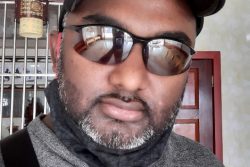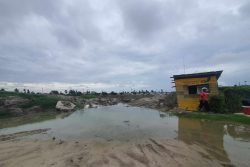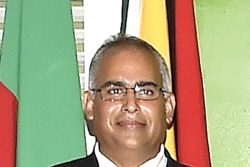Dear Editor,
I present this tribute/reflection on the life and political struggle of Stanley Humphrey Collins, a resident of Linden and Executive member of the WPA, who passed away on Thursday, May 11th, 2023.
Since his passing, numerous tributes and condolences have poured in from party members, supporters, and political colleagues. I have chosen a quotation from Brother Moses Bhagwan’s tribute as it profoundly encapsulates the life and struggle of Comrade Stanley: “A faithful servant of the people of his community, a bridge between the WPA and WISMAC, an activist of great sincerity and humility, consistent and reliable…”
Long before he became politically prominent in Linden, Stanley had achieved recognition in the community as an athlete, footballer, union shop steward and member of the OWP. He earned a reputation as a “people man/person” who was not afraid to stand up and defend his convictions with little concern for consequences. It is this reputation he brought to political activism when he joined the WPA, influenced by Walter Rodney’s work and struggle with bauxite workers of which he was part. Like militants of the period in a profoundly PNC stronghold politically, he was individually and collectively a victim of political oppression by the then ruling party. In the 1980s he along with other workers on strike were arrested and tear-gassed in a police lockup. Subsequently retrenched and ending his employment with the government-controlled Bauxite Company led to him becoming a full-time political activist and self-appointed community worker facilitating people’s social and political endeavours.
He became a WPA Executive member, (a position he held until his departure to the land of his ancestors) a representative of the RDC, the party Linden Centre Manager and a member of the board of Linden Electricity Company. In these roles, he was incorruptible, principled, and unshakable in his commitment to community, party and country. Over time he became the symbol of the WPA in Linden, a political institution embodying the political struggles of the bauxite workers and the community. Anyone arriving in Linden who wished to make contact with WPA or Stanley only had to mention his name and more often than not, someone would have been able to direct you to his “liming” spots and hangouts. His popularity was unquestionable – a man of the people and known to the people. His commitment to the workers and the national struggle which he sought to influence also influenced him forcing him to rise to new heights. He did so conscious of his limitations but was always willing to challenge himself even when he felt unprepared and not up to the task. I remember joining him for party campaigns and public meetings in the community and his apprehension at speaking at public meetings, given the party’s reputation in this area of political advocacy. With some coaching which he often demanded, he quickly overcame his reservations and got the job done, emerging with greater self-confidence and a stronger resolve to wage the struggle.
His activities as a union representative gave him a keen sense of the importance of making the correct judgement of persons with whom he came into contact. He did this without concern for the person’s status, race or political position, in short, friend or foe. His politics was “no retreat no surrender”, a position he held to his death. Like thousands of Guyanese of the period, Walter Rodney was his political hero and an embodiment of a thorough revolutionary and political leader. Rodney’s assassination on June 13th 1980 strengthened Stanley’s commitment to struggle to the very end.
While he could relate to the political divide, he had “red lines” that were not subject to compromise. Like most WPA persons who had difficulties with the WPA/PNC relationship, in spite of reservations, he supported our alliance with that party and the formation of the APNU. and later the APNU+AFC coalition. He often pointed out that the PNC people in Linden and the leadership in Georgetown did not like him because he represented the WPA. They tolerated him but marginalised him and the party in the RDC. We had a good example of his correct judgement on the above matter during the Granger-led administration. His name and Ali Majeed, WPA Region 4 representative in the RDC, were among ten names the party submitted to then President Granger for consideration for employment which was never addressed. On this issue, Stanley was convinced, that he would never be employed by a PNC-led administration. He saw it as a continuation of the hostility of the Burnham period and payback for the work of bringing the bauxite workers and the Linden community close to Walter Rodney and the WPA.
In the run-up to the 2020 General and Regional Elections, WPA requested and had a frank meeting with President Granger and the PNC on the party’s view of relations particularly the negative aspect of those relations. An important issue was the WPA’s right to name its candidates to areas of the list and order of priority in the selection. We came out of the meeting with the assurance that our concerns would be addressed. When we submitted our list of candidates, Stanley Humphrey’s name was removed from the Region 10 list. We drew it to the attention of the relevant official and not having the matter addressed, we wrote to Granger as leader of the APNU expressing our concern. He did nothing. In the correspondence, I pointed out the importance of comrade Humphrey’s candidacy to the WPA making the point that this was a grievous matter since it meant that for the first time in the party’s history, it had no candidate in the Region 10 elections. The WPA saw this as an act of bad faith on the part of Granger. It was for us, in political terms, the treatment of Stanley and Ali Majeed, bauxite workers who were victims of Burnhamism now became victims of Grangerism. These developments along with other issues were major considerations in the party’s decision to leave the APNU. I felt compelled to raise these political matters, convinced that comrade Stanley Humphrey Collins would expect me to do so.
Our last major political work was in the 2020 elections. I was listed to speak in Linden I went up early to get a sense of the community and to meet members/supporters. While on the way to the meeting Stanley, and I met some PNC organisers and spoke of the importance of the meeting and the strength of the platform. To our surprise, the meeting ended and I was never called to speak although my name was among those advertised to speak. And while we stood there we heard the chairperson calling and inquiring about the presence of speakers. Stanley and I reasoned that I was deliberately excluded for fear that I would have used the opportunity to explain his absence from the Region Ten list.
As noted by Stanley’s friends and comrades, he possessed astute observational skills when it came to character assessment. Additionally, he had a sharp wit and took delight in playfully teasing his fellow party comrades about their qualities or actions.
Brother, Comrade and warrior rest in peace. A work well done. My sympathy and solidarity with his immediate family and relatives.
Yours sincerely,
Tacuma Ogunseye






